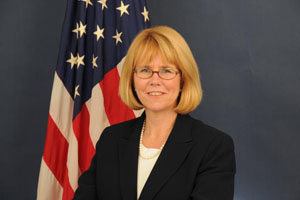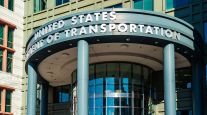Ferro Tells Senate Panel HOS Rules are Working

Federal Motor Carrier Safety Administrator Anne Ferro told a Senate panel that the agency knew its new hours-of-service rules would affect trucking’s productivity but that data is expected to show the HOS rules are increasing safety.
Once all trucks have electronic logging devices per a proposed rule, FMCSA will have precise data on how the HOS rules are working, Ferro said at a June 3 hearing held by the Committee on Commerce, Science and Transportation.
“This proposal will improve hours-of-service compliance and, hence, the uniform use of those logs will actually improve and mitigate the impact of fatigue-related driving and fatigue-related crashes,” she said.
Under questioning from senators quizzing her on the impact of the new rule, Ferro said she recognizes that some sectors of the trucking industry had to make adjustments to meet the rule’s restart provision, but trucking is currently hitting profitability levels it has never seen before, she said.
The restart effectively requires drivers to take two consecutive days of rest before starting a new workweek.
Sen. Kelly Ayotte (R-N.H.) questioned whether the new restart requirements are not enhancing safety but undermining it.
“My question simply to you is, under this rule, we are going to have more drivers driving during daytime hours, isn’t that true?” Ayotte asked, citing an FMCSA study released in January that addressed that issue.
“That will be part of what we will continue to analyze going forward,” Ferro said. “We have not seen that.”
She said the FMCSA study found that the impact is “incremental” and that “in the mix of all the commercial traffic that starts early mornings across our country we think the impact is far outweighed by the improved driver safety.”
The study, done on 106 drivers, found that drivers affected by the new restart rule are primarily nighttime drivers.
Ayotte questioned whether the study’s sample was large enough, something that was also questioned by the American Transportation Research Institute in an April analysis it did of the FMCSA study.
Ferro said the study was the largest of its kind ever done.
Like Ayotte, the trucking industry has said that the restart rule is putting more trucks on the road during the day.
ATRI’s analysis of FMCSA’s study said the study showed that a driver “was likely to be driving primarily at night” when he or she had only one nighttime break as was the custom under the old restart rule.
Sen. John Thune (R-N.D.), the committee’s ranking Republican member, asked Ferro for an update on FMCSA’s response to two independent analyses that found shortcomings in the agency’s safety program, Compliance, Safety, Accountability.
Ferro said FMCSA has responded to all the points and is making “full use” of the recommendations from the studies done by the General Accountability Office and the Inspector General.
She said the one point of contention between GAO and FMCSA is over methodology, with GAO suggesting that the agency narrow its data collection by concentrating on large carrier incidents.
“While large carriers have a significant impact on crash activity across our country,” Ferro said, “smaller carriers impact about half of those fatalities and injury crashes, so, it’s important that we look at the full spectrum.”




